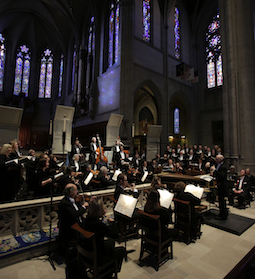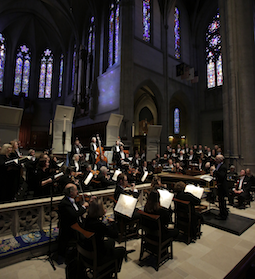
Even Bach couldn’t compose all the music Bach composed. By reusing, recycling, repurposing, and recontextualizing, he mastered the art of making things old new again. Call it Bach redux or Baroque efficiency. Either way, it’s music well worth meeting again in fresh new garb.
That’s one of the threads running through the American Bach Soloists’ 25th anniversary season. As the ensemble did last month, by programming a secular cantata that Bach would later tap as source material for his “Christmas Oratorio,” this past weekend’s concerts featured more music that underwent that same transformation. Jeffery Thomas conducted, as usual, with steady, sustaining excellence.
Hercules, an amusingly contrived musical birthday gift for the Saxon Prince Friedrich Christian’s 11th birthday in 1733, keeps ringing the “Christmas Oratorio” bells of familiarity. Instead of celebrating the birth of Jesus and the glory of God, this 35-minute cantata pits a tenor Virtue against a soprano Vice, in a battle for the moral fate of Hercules (a mythical emblem and stand-in for the high-born birthday boy). There’s not much suspense about who wins out. Birthday presents are rewards for good boys on the way to becoming good men.
The concert also included a fine short Mass — the Lutheran Mass in G Major, BWV 236 — that illustrates another kind of 18th-century musical reworking. In a technique known as “parody,” as Alexandra Amati-Camperi explains in a program note, Bach pasted new Latin texts onto pre-existing German-language cantata movements and sometimes reconfigured them musically to create what the annotator calls “a compendium, an anthology of styles, and affects.”
Fascinating as such backstories are, the works have to stand on their own merits. And so, by and large, both these examples of Bachian resourcefulness did. The echoes of earlier works and anticipation of ones to come only deepened the listener’s sense of Bach’s seemingly bottomless well of genius.
The ABS concert, heard Sunday at St. Mark’s Lutheran Church, got off to a splendid start, with the sunny Orchestral Suite No.1 in C Major. It was an occasion for all to shine. Oboists Debra Nagy and Stephen Bard, joined in turn by bassoonist Dominic Teresi, were the beguiling champions of the fugue-like Overture. The strings enlivened the Gavotte with a sly subversive figure snuck under the main subject. The Bourée sprinted along with coiled energy, a free-wheeling jam session for the winds jimmied into the middle. Only the whirl of notes in the Forlane got a little foggy.
Bach’s flair for drama was apparent from the opening choral numbers of this Lutheran Mass, one of four the composer devised. Accompanied only by the organ continuo (an expert Corey Jamison), the men intoned a somberly arresting plea for mercy in the Kyrie. Then the women lofted a calm and confident Gloria to the upper registers, which in turn sent the orchestra off in scurrying celebration. The chorus brought the proceedings to a glorious close, weaving through the contrapuntal lines of the Cum Sancto Spiritu with fluid momentum.
The spare settings for the two arias and one duet provided a clear contrast, dimmed a little by comparison to the stirring choruses. Soprano Kathryn Mueller and countertenor Ian Howell ran their lovely parallel and sinuously intertwining melodies against the violins and basso continuo. Tenor Derek Chester brought a striking speech-like directness to his conversation with the oboe. Baritone Jesse Blumberg, challenged by a busily oscillating melody, sounded a bit ragged.
Hercules occupied the second part of the program. Once again Bach’s dramatic instincts were on full display. An elegant and poised chorus invoked the Gods as the orchestra and horns enthusiastically concurred. Howell, as the eager and high-spirited hero, wondered in a lively recitative where the “true path” led.
“Schlafe, ” urged Vice. “Sleep, my beloved, and cultivate ease.” Mueller might have been more seductive in her appeal, but her high notes had a lustrous allure. After a sharp recitative exchange with her rival, Virtue got the rest of the winning argument. Tenor Chester earned it, with his clean tone, intricate passagework and ornamental flourishes. He even beamed virtuously.
Howell made the most of a theatrical echo number, a three-way conversation with the self-echoing oboe and an offstage countertenor. Blumberg made an impressive showing as a well-wishing Mercury at the end.
Just before the first downbeat of the piece, Thomas turned to the house to wish Handel a happy 329th birthday. Why not think of the line about the birthday boy Friedrich near the end of Hercules, mused the conductor, as a reference to George Frideric Handel? It was a fine and fitting idea for another serial recycler of his own music.

